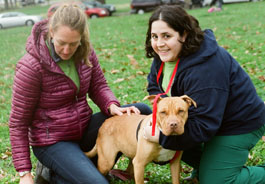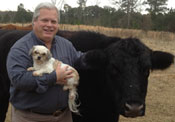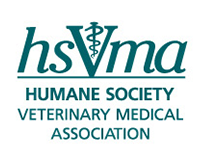Re-energize Your Commitment to Helping Animals in Need with The HSUS’ Pets for Life Programby Will Mangham, DVM January 9, 2013  HSVMA member Dr. Jennie Lane and Elyse Berger, a veterinary technician, administer vaccines during a Pets for Life event in Philadelphia. Lynn Fenimore/LynnRae Photography HSVMA members, through volunteerism and member support, have been instrumental in the effectiveness of the HSVMA Rural Area Veterinary Services (HSVMA-RAVS) program, which provides desperately-needed veterinary care in remote areas such as Native American reservations. The positive effects of HSVMA-RAVS’ veterinary aid, both immediate and certainly long-term, cannot be argued. Both animals and people benefit. The Humane Society of the United States has recently launched another incredibly fast-growing program that also shares a focus on the human component of companion animals – Pets for Life. PFL directs its efforts and resources to providing pet wellness information, guidance, vaccination and spay/neuter services, and advocacy to people in under-served communities in urban areas. The HSUS operates programs in Philadelphia, Atlanta, Chicago, and Los Angeles and, through a partnership with PetSmart Charities, is providing grants and mentorship to 10 organizations across the country to establish their own PFL-style outreach program. There is also a comprehensive outreach toolkit available free online or for purchase in print that guides any group, individual or organization on how to incorporate pieces of the PFL approach into their work or even implement a full outreach program. I hope HSVMA members will consider getting involved in this program since, as with the RAVS program, veterinary support is critical to its success. Additionally, PFL gives us the opportunity to intensely experience a sense of serving the animals we pledged to care for, and to help our fellow humans who are incredibly grateful for what we do. Helping the Under-servedThe PFL communities are typically in urban areas where the people and their animals have essentially been overlooked by service providers or excluded due to long-standing financial and geographic barriers. Along with human food and services “deserts,” these neighborhoods lack veterinary services and pet resources such as pet supply stores. Additionally, transportation options are usually not available to provide access to services elsewhere. All of these factors add up to an overwhelming situation for people and their pets. In the veterinary community, it is widely agreed that the vast majority of pet owners truly love their pets, depend on their companionship, and feel a sense of responsibility and self-worth in caring for their pets. This is no less true in these under-served neighborhoods, and possibly more so because in many cases these people have very little else to depend on. Pets for Life reaches pet owners and pets through community outreach focusing on door-to-door visits and street-by-street canvassing to meet people, become part of the neighborhood, and offer services. PFL also hosts frequent community outreach events that provide free vaccinations, engagement on and scheduling of free spay/neuter surgeries, as well as free weekly dog training classes. The goal is to establish long-standing relationships between PFL and the neighborhood, and allow the spread of sorely-needed pet wellness information through respectful and understanding engagement. The veterinarians involved with the community outreach events are either volunteers or are provided a small stipend for vaccinating, assessing, and counseling for about four hours on a weekend day. Doing Good and Making a Real Difference
My own direct experience has been with the PFL events held in Atlanta and Philadelphia, and I can say unequivocally that nothing in my 20-plus years as a veterinarian has allowed me to do as much good in as short a time. The pet owners start lining up hours prior to the event start time and, with almost no exceptions, wait patiently for the opportunity to bring their pet to the vet--most for the first time. Most events have between 400 to 600 attendees and are well-staffed by PFL team members and informed and capable volunteers, including veterinary technicians. Volunteers manage the line, discuss spay/neuter with each and every person, and collect paperwork on every single person and pet in attendance, gathering essential and useful data on the pet needs and services provided while the veterinary personnel concentrate on the hands-on efforts and education. Many health issues unknown to the pet owners can be recognized and pointed out, and owners can be counseled on the benefits of spay/neuter, allowing the pets to lead healthier lives. In more cases than one would expect, owners shed tears of gratitude because someone else shows that they also value their pet and wants to help them provide the best care possible. Many of us experience periodic “burn-out” or professional fatigue which is assuaged with a vacation or a good CE conference, or even a successful outcome in a really challenging case. Becoming involved with Pets for Life and the people and pets they serve will also go a long way to re-energizing us and reminding us why we became veterinary professionals with a desire to better the lives of animals and the people who care for them in the first place. I encourage you to find out more.
 Dr. Will Mangham with Emma, one of his rescue dogs and the smallest of his herd, and Jack a rescue/orphan steer and the largest of his herd. Will Mangham, DVM Dr. Mangham is a 1992 graduate of the Tuskegee University School of Veterinary Medicine. Following veterinary school, he was in mixed practice for several years including exotics, wildlife, and animal rescue. Dr. Mangham helped start the spay/neuter clinic for Lifeline Animal Project in an Atlanta suburb in 2004 followed by work in several other spay/neuter clinics and assisting various animal rescue and TNR groups in Georgia. Dr. Mangham began volunteering with PFL in 2011 through collaboration with Lifeline Animal Project and came on board as a Veterinary Consultant for PFL in 2012. Dr. Mangham enjoys living with and enjoying the many and varied temporary and long-term animal residents in his care on his farm outside Atlanta. |
